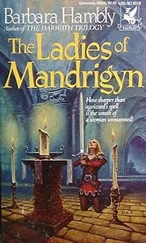But he was no Richelieu, she thought. When the enemy turned up again, he had mounted his horse and ridden to the battlefield, something not even Washington had done as President. And had it been necessary, she understood, looking down at him, he would have died under the British guns.
“I hope Dolley understands,” he said, and Sophie smiled.
“She spoke of defending this house with Patsy Jefferson’s Tunisian saber.”
His grin was bright as a boy’s. “That’s my Dolley.”
It was yet daylight when they left the Mansion, the last rays of the sun sickly yellow beneath the blackness of the coming storm. Sophie helped Paul Jennings lock up the doors for what she knew was going to be the last time.
Then the young man set off on foot for the Georgetown ferry, and Sophie went back to her house on Connecticut Avenue, to ready her own gig for a drive.

Not long after that, the British came.
Sophie could see them easily in the thickening twilight. There were about two hundred of them, an advance guard, sailors, not soldiers, with little black hats and tarry pigtails hanging down on their shoulders. Sophie picked out General Ross at their head on a dappled horse, and beside him Admiral Cockburn in his blue Navy uniform. Dust gritted in Sophie’s nose and throat.
Where the Avenue crossed Second Street someone fired a single volley from a house on the corner. Ross’s horse staggered and fell under him, blood glistening on its neck. The general hadn’t even sprung clear of the saddle before men were breaking down the door of the house. A hundred feet away, Sophie saw dark figures dart from the back of the house and vanish into the dusk. An officer came out the front door and called, “Nobody here, sir. And no guns.”
Sophie heard Cockburn snarl, “By God, they’ll pay for this!” and over his voice Ross’s, angry but calm. “Burn the house, Mr. Starrett. Was anyone hurt? Get them back to the ambulance wagons….”
Someone brought him up a fresh horse.
That was the sum total of the capital’s defense.
The men set up a rough camp on an empty field east of the Capitol Building. From the trees that surrounded the nearby Carroll Hotel, Sophie watched the detachment led by Ross ascend Capitol Hill, the flares of their torches dripping fragments of tar that burned in the dirt behind them as the Devil’s hoofprints were said to burn. She heard the crack of rifles, the shattering of window-glass. Moments later, scarlet reflections flitted in the windows of the two legislative houses and in the open wooden passageway between. They must have either brought powder with them, she thought, or found it there. The sound it made when it exploded in the connecting passageway was unmistakable, and as the flames rippled up, Sophie saw the men moving about inside, gathering up whatever they could to feed the blaze.
They moved on by torchlight up Pennsylvania Avenue, walking in double column without drum-beat or bugle, muffled footsteps a heavy whisper in the dust. Strange little gusts of wind had begun to stir the trees, and overhead the tar-black sky was streaked with heat-lightning. Like the ghost of her own parents—or of the girl she had once been—Sophie followed in her dark gown, as if she’d been assigned the task by someone else, to fulfill a rite for those who were dead.
She stood for a long time outside the President’s House, watching torchlight play through the windows as it was first searched, then ransacked for whatever the looters had missed. Since that first winter, when she’d called on Abigail Adams, the place had gone from a dank and gloomy cavern to a very respectable mansion, thanks to Jefferson’s delight in remodeling, and to Dolley’s exquisite taste.
They might all have saved themselves the trouble.
As her grandparents might have, back in Virginia, had they known.
She had waited a long time, she reflected, to watch this. And yet she felt almost nothing. She heard the breaking glass as the men smashed out the ground-floor windows, and torchlight flowed around the doors as everyone came out again. By that torchlight she saw Ross line up men outside each window, with poles like javelins in their hands. At the end of each pole was a ball about the size of a soup-plate—oiled rags. The British army had a system for everything.
A torch was borne the full circuit of the house, touching each javelin in turn, until the white sandstone walls were ringed with fire. In the silence Sophie was aware of others, half glimpsed in shadow, among the young trees that Mr. Jefferson had had planted to screen the house from the Avenue. Civilians, watching in silence—listening to the shouts of the bands of stragglers from the British camp who were now roving through the darkness, looking for what they might steal.
General Ross spoke his word of command, and a color-sergeant shouted it. In unison the men threw their javelins through the broken windows, like a well-crafted machine. The whole house went up at once, each window around the lower floor glaring like yellow eyes into Hell. Red flickered, then blazed, in those on the second floor.
For a time they stood in silence and watched it burn.
Thinking what? Sophie wondered. Feeling what? The sweet brandy of vengeance? Or just a solid craftsmanlike awareness of a job well done?
Had any man of them been born in these colonies? Watched his own family’s house go up in flames, knowing there was no other place of refuge to be had in all the land?
She wondered why she felt so little. Flames licked through the windows, danced over the blazing roof. Yet her only experience was a slight sensation of disappointment: like the much-anticipated embrace of a lover who turns out to be only a man like other men.
She tried to recapture the shouts of the patriot militia who’d torched her grandparents’ plantation, but the only words she heard were Madison’s: There is never any going back, but what we strive for now is to choose our own path forward.
And Dolley: We all need reminders of who we were and where we came from, if our hearts are to survive.
But survive to go on to where?
And others behind them, like spectres taking shape within the smoke. Plump little Mrs. Washington, hiding her fears for the General and her grandchildren behind chatty efficiency. Mrs. Adams like spring-steel, ready to shed her own blood or anyone else’s for John’s sake and for her country’s. Sally seeming to appear and disappear through the smoke, a spirit outlasting scandal and time.
If I hate those men and what they did, I must hate the women who helped them—let them—be what they were.
Yet she found she did not. Nor did she feel pity for them. Only the comradeship of those who have passed through the same battle, albeit on different parts of the field.
Liberté—Amitié: Liberty and love, that most ancient of conundra. Did all things come at last to where they were meant to be?
Sophie had meant to go to General Ross, when the burning was done, as she’d been instructed to do, and let him know where Dolley and her husband were to be found. A fast-moving company could be at Salona Plantation by midnight. She knew Mr. Madison was right: Without a rallying-point, the scattered militia companies, the fragments of the fast-dissolving government, would disperse.
Without a central focus, the individual States would take up their old position of leadership, and each State—squabbling with the others as usual over debts and privileges and shipping rights as they had all throughout the Revolution and for four years beyond—could be dealt with piecemeal far more easily than the Congress of the whole.
Читать дальше






